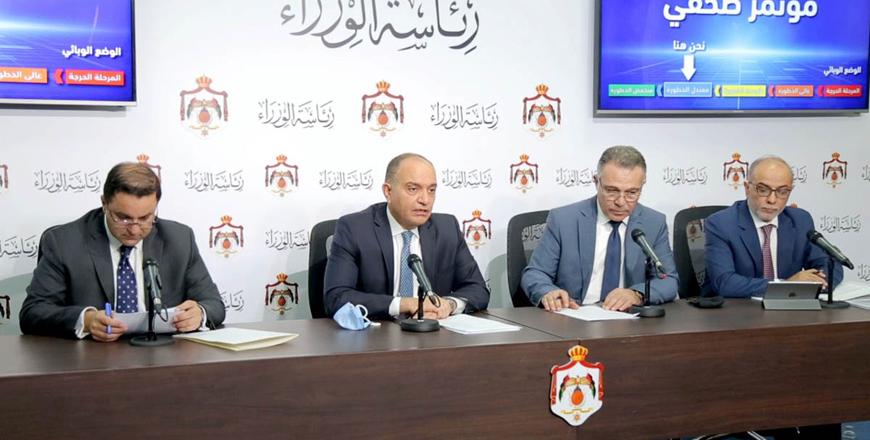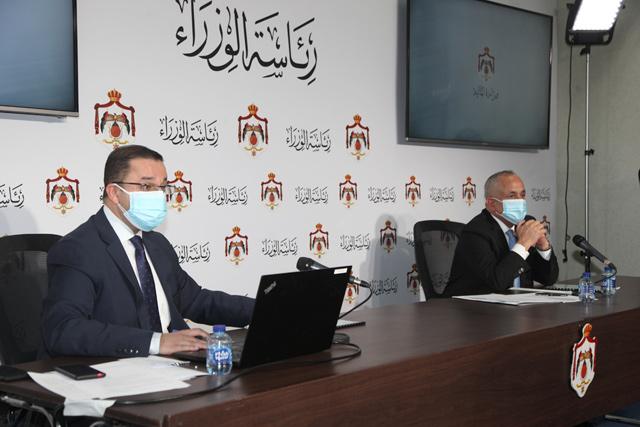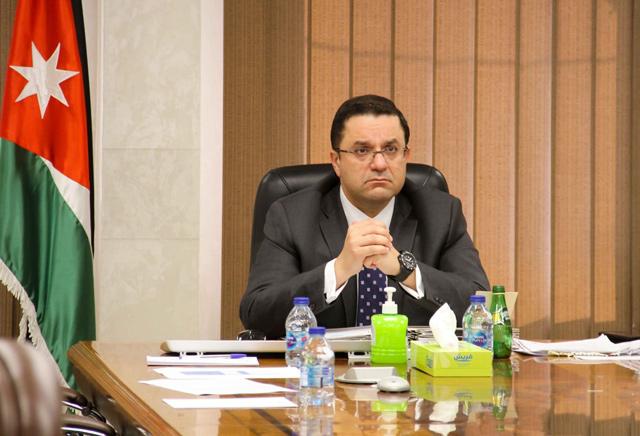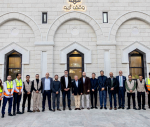You are here
Gov’t to pay nearly JD1b in dues to private sector by year-end — Al-Ississ
By Maram Kayed - Jul 08,2020 - Last updated at Jul 08,2020

Minister of State for Media Affairs Amjad Adaileh speaks during a joint media briefing with Finance Minister Mohamad Al-Ississ, Minister of Planning and International Cooperation Wissam Rabadi and Chairman of the Jordan Investment Commission Khaled Wazani in Amman on Wednesday (Petra photo)
AMMAN — Minister of Finance Mohamad Al-Ississ said that the government will pay JD800 million-JD1 billion in dues to the private sector by the end of this year in a press conference dedicated to discuss the financial recovery of the Kingdom amid the coronavirus pandemic.
The minister noted that JD300 million have already been paid to “sectors in need”, such as the health sector, the construction sector, the energy sector and the pharmaceutical sector.
Minister of Planning and International Cooperation Wissam Rabadi added during the conference that Jordan has received JD950 million from its World Bank loan and is expected to receive another JD3.8 billion in loans and grants by the end of this year.
“Debt is always an unfavourable option, but we have to be realistic and try to escape this crisis with as little collateral damage as possible,” said Al-Ississ.
Minister of State for Media Affairs Amjad Adaileh, also speaking during the conference, said that Jordan has signed several agreements to “ease the repercussions of the crisis on the Kingdom”, highlighting that it has had to revise its spending habits and priorities.
He also noted that the government has started issuing financial support to several sectors, including tourism and medical tourism.
The third batch of the Day Workers Support Programme will be issuing their allowances next week, with 250,000 families receiving an amount of JD 27 million, according to Adaileh.
“The programmes of the National Aid Fund, the Social Security Corporation and the Central Bank have reached about one million beneficiary families,” he added.
More than 55,000 families have benefitted from the “Takaful” programme while 105,000 families have benefitted from the recurring monthly financial aid programme, with a total amount of JD14 million and JD9 million allocated to each programme, respectively.
The number of establishments benefitting from the Economic Empowerment Programme (1) reached 6,700 establishments, which included approximately 136,000 workers, according to the minister.
The average value of loans provided to establishments and companies amounted to around JD98,000, with Adaileh highlighting that loans exceeding JD250,000 amounted to “only 4 per cent, which indicates that the majority of the financing goes to companies and small and medium enterprises”.
Al-Ississ said that in light of the global, and thus national, fall in revenues and increase in spending, the Jordanian government’s focus was to pump liquidity into the Kingdom while decreasing interest rates.
The minister noted that last week, the Finance Ministry entered the Eurobond market, adding that it “chose the Eurobond market as to not overflow the local market and thus affect the private sector in the Kingdom”.
According to Rabadi, the value of the foreign aid that was committed to and paid during the first-half of this year amounted to $564 million, of which grants amounted to $342 million (JD242 million), and soft loans to $222 million (JD157 million).
He explained that two weeks ago, he announced the completion of negotiations on new foreign aid from grants and soft loans worth $1.6 billion (JD1.13 billion) to support education and social protection in order to respond to the repercussions of the coronavirus crisis.
Rabadi said that most of the aid “will be spent through the public budget and the National Aid Fund, although some entities such as the USAID and GIZ prefer to support the programmes directly without going through the budget”.
The Chairman of the Jordan Investment Commission (JIC) Khaled Wazani said that the Jordanian economy “represents stability, security and safety of the Kingdom’s long-term monetary and financial decisions as well as its high ability to deal with sudden crises”.
Wazani added that during the prime minister’s visit to the commission on Wednesday, the authority presented 91 new projects launched in Jordan from the beginning of the year until the end of last month.
The projects include 52 new endeavours launched between March and June, during the “peak of dealing with the novel coronavirus crisis,” according to Wazani.
The JIC chairman noted that the commission received 905 investment requests during the pandemic period and 853 requests for expansion, modernisation and development. He also noted that the 52 new projects will provide 1,110 new jobs, with an investment reaching $50 million in four sectors, including industry, agriculture, tourism and other sectors.
Related Articles
AMMAN — The estimated general public debt in 2024 is JD33.534 billion or 88.3 per cent of the Gross Domestic Production (GDP), Finance Minis
AMMAN — The government has endorsed the 2021 state budget with an estimated deficit of JD1.180 billion, accounting for 3.7 per cent of
AMMAN — Representing Jordan for a session by the G20 titled “Policy options to tackle the current situation and support the return of capita


















